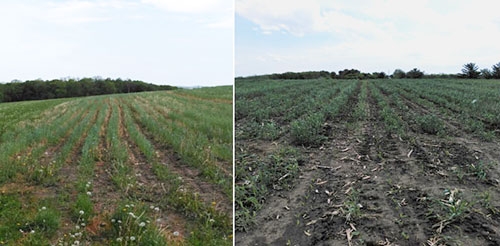You are here
Home ›Waterville area farmer uses alternative farming practice to improve soil

Submitted by Eric Novey, Project Coordinator, Allamakee SWCD
Nick Rolling, who farms near Waterville, recently tried a different farming practice. He band applied herbicide (1 ½ pt Dual and 1 qt Roundup) on corn and soybeans while planting into fall seeded rye cover crop. His goals were to suppress weed growth, capture nitrogen from leeching, reduce soil erosion, increase water infiltration, and to increase his overall soil health by getting as much root growth as possible from the rye. Rolling plans to terminate the rye soon.
Research done through the United Soybean Board has shown when cereal rye grew an extra three weeks prior to soybeans, they produced about 300-400% more biomass with a 100% increase in nitrogen retention, compared to early terminated cover crops, with no yield reduction.
On heavy soils standing cover crop provides an excellent seedbed. Unlike tillage, planting green creates no root-balls or root masses that pose planting roadblocks. “Planting cereal rye is our tillage pass,” Rolling adds. “By doing so, we’ve saved an estimated $30 per acre on tractor depreciation, diesel fuel, and equipment maintenance.”
Undisturbed no-till fields with a living root system also expand earthworm populations. The soil tunnels they carve help channel precipitation into the soil instead of leaving via runoff. Undisturbed soils help support a thriving microbe community that helps crops better absorb nutrients. Meanwhile, inputs are minimal.

